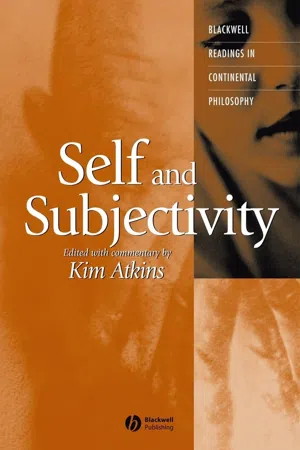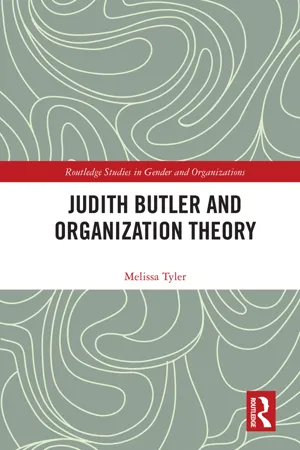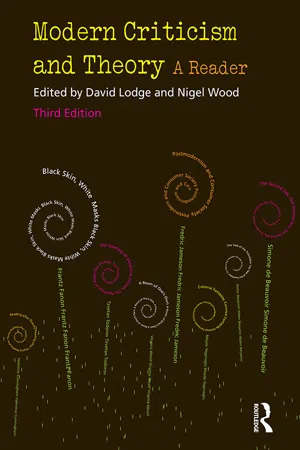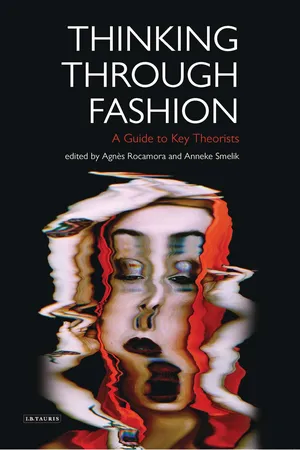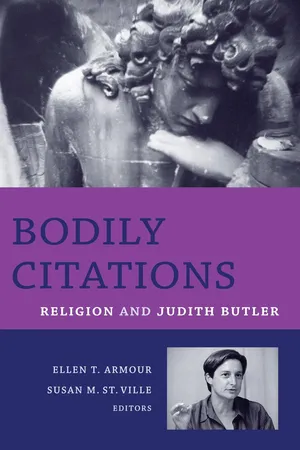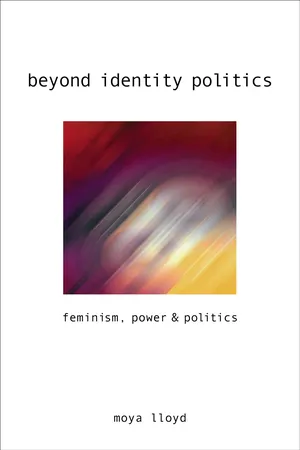Politics & International Relations
Judith Butler
Judith Butler is a prominent philosopher and gender theorist known for her work on gender performativity and queer theory. She has made significant contributions to the understanding of gender as a social construct and has influenced feminist and LGBTQ+ movements. Butler's ideas have had a profound impact on the fields of gender studies, philosophy, and cultural theory.
Written by Perlego with AI-assistance
Related key terms
1 of 5
12 Key excerpts on "Judith Butler"
- Robert McMurray, Alison Pullen(Authors)
- 2020(Publication Date)
- Routledge(Publisher)
6 Judith Butler Theorist and political activist Nancy HardingJudith Butler, a hugely influential but also controversial theorist, is a philosopher whose writings are not often found on the bookshelves labelled ‘philosophy’. Her job title is ‘Professor of Comparative Literature’, but her work on literature is a very small part of her oeuvre. An avowed feminist, her early, major books Gender Trouble and Bodies that Matter are seminal within queer theory.1 What is in no doubt is that she is one of the most important theorists in feminist and gender studies and her influence extends across disciplines, contributing not only to feminist, gender or queer accounts in those disciplines, but to new ways of thinking through and theorizing some major issues for academia in the 21st century. These include, for example, what form of left-wing politics might emerge to combat the rise of far-right extremism; who can and cannot be classed as ‘human’ and therefore disposable or protected; and whose lives are made precarious by the actions of governments?Butler’s work has provoked significant interest in management and organization studies, both through its influence on feminist or gender theories of work but also because her thesis of performativity (whose meaning will be unfolded in the next section) offers ways of understanding management, organizations and work more generally. Sometimes inadequate attention has been paid to the nuances of this influential theory, perhaps not surprisingly because her earlier works in particular are very difficult to absorb even after several readings. It could be tempting, after struggling with her early work, to ignore her later publications. This would be wrong because her account of performativity has developed. This chapter tracks those changes, showing how an increasingly sophisticated but more accessible account of performativity has evolved in her writing. Butler’s more recent work focused on developing a new radical politics through a feminist ethics of precarity and relationality and continues to build on her account of performativity. This chapter barely touches the surface of Butler’s influence in management and organization studies to date due to space constraints; rather it will look to the future and how, through tracking Butler’s evolving thought, possibilities for a new politics of working lives may be developed.- eBook - PDF
- Kim Atkins(Author)
- 2008(Publication Date)
- Wiley-Blackwell(Publisher)
19 COMMENTARY ON BUTLER Judith Butler (born 1956) is Professor of Comparative Literature and Rhetoric at the University of California, Berkeley. She is best known for her work on gender identity, sexuality, and power, and is a key figure in post-structuralist and postmodern feminist philosophy and queer theory. Butler’s work is heavily influenced by Hegel, Nietzsche, Merleau-Ponty, Beauvoir, and Lacan, but most significantly by Foucault. In her hugely popular book, Gender Trouble , she argues that norms of gender identity are constructed and stabilized within a cultural hegemony which chains gender to sex according to an imperative of heterosexual reproductive biology. Butler’s account of gender identity continues Foucault’s Nietzschean critique of subjectivity, in which subjectivity is understood as the effect of the subject-positions articulated in discourse. However, she goes further than Foucault in her account of identity as “performative.”This concept describes the mechanisms by which particular subjectivities are formed through the submission of bodies to discursive practices. Through her concept of performativity, Butler brings to light the repetition involved in the ways in which disciplinary power is lived by and habituated into the individual’s life. By identifying the repetitive and reiterative processes of inscription of social norms in the body, Butler emphasizes the discontinuous nature of identity.This allows her to locate the possibility of resistance within the process of reiteration itself. Butler takes up the issue of gender identity as part of her commitment to under-standing and redressing sexual oppression. In the opening pages of Gender Trouble , she points out that feminist theory has assumed that “there is an existing identity, under-stood through the category of women” and that it is this identifiable female subject whose interests feminism has attempted to further through political representation. - eBook - ePub
- Melissa Tyler(Author)
- 2019(Publication Date)
- Routledge(Publisher)
IntroductionJudith Butler is perhaps the most widely cited contemporary feminist philosopher. Although her work emanates from the United States, she holds a number of international academic posts; her writing has global resonance and has been translated into at least twenty languages. It draws from and speaks to a range of empirical ‘problems’, philosophical and political, contemporary and historical, and engages a complex and rich variety of theoretical traditions. A recent article in the New York Times magazine cited her performative theory of gender as recognizable to an audience well beyond academia, albeit in a popularized form (Fischer, 2016).1 As Vicki Kirby (2006) has noted, Butler’s writing is a valuable illustration of how to read critically and generously, unfettered by disciplinary boundaries whilst at the same time being painstakingly respectful of intellectual traditions and dialogues. The latter has often led to criticisms of Butler’s work as being overly and unnecessarily complex,2 yet it is a significant scholarly template, one that connects academic and activist concerns, and which shows what is possible when we write and think about mutual recognition3 - eBook - PDF
From Agamben to Zizek
Contemporary Critical Theorists
- Jon Simons(Author)
- 2010(Publication Date)
- EUP(Publisher)
Butler’s idea of performativity has been drawn on not only to illuminate further the relation between sex, gender and sexuality but also the performativity of race. The concept of life’s precariousness has been influential in recent international relations theory. Her understanding of subjectivity had been used in film interpretation, while the idea of cultural unintelli-gibility has been borrowed to explore questions of immigration and asylum. Volumes have been published examining Butler’s politics, the influence of her ideas on the study of religion and her contribution to the study of law. In addition, several special Judith Butler (1956–) 89 issues of journals have also appeared, exploring the impact of her work on the sociology of education, as well as on, for example, feminist and queer studies. Extracts from her writings are found in most readers on feminist or queer theory, and in many on the body. Scholars have recently begun to explore her contribution to radical democratic theory. It is fair to say, however, that for all their influence Butler’s ideas have divided her critics. Some responses have been posi-tively vitriolic. Others have drawn attention in a more measured fashion to perceived limitations with her ideas. Her interpretations of other thinkers, from Beauvoir, through Foucault, to Catharine MacKinnon, have troubled several scholars, who have challenged her for being idiosyncratic, partial, even for distorting the writing with which she is engaging. She has been criticised for failing to stipulate normative criteria against which to measure ‘good’ per-formances from ‘bad’ and ‘good’ norms from ‘bad’ norms, taken to task for failing to deal with the ‘realities’ of (women’s) oppression and condemned for her ‘hip quietism’. 42 At the same time, however, still others have found questions in her work, undoubtedly, but also insight. From the outset, Butler has responded to her critics – though not always by directly engaging with them. - Stewart Clegg, Miguel Pina e Cunha, Stewart Clegg, Miguel Pina e Cunha(Authors)
- 2019(Publication Date)
- Routledge(Publisher)
13 Judith Butler and performativity Kate KennyChapter objectives
This chapter discusses:- How Butler’s early work examining discourses of gender and sexuality gave rise to her theories of identification and subjection
- Butler’s practical relevance as an influential thinker and a social activist
- Affective recognition and its location relative to other post-structural and psychoanalytic thinking, including that of Foucault and Lacan
- An overview of this approach including its relevance for debates about the relation between self and other, and agency and structure, within organization studies
- The concept of performativity and its implications for studies of networks of power and discourse
- The effects of subjection, including dynamics of exclusion and violence
Introduction
Unwilled proximity and unchosen cohabitation are preconditions of our political existence (Judith Butler, Notes Towards a Performative Theory of Assembly ).I felt overwhelmed with pride and gratitude that someone with the integrity to be so out as a lesbian was taking the leadership that the rest of us needed, not just emotionally but practically. It had been a long time since I felt real leadership before me that I could rely on. I experienced a great feeling of relief to see and hear that other voice, that other face literally creating a context one day, for me, whereas the day before there was none (Sarah Schulman [artist-activist and Distinguished Professor of English at the City University of New York]).Judith Butler holds the Hannah Arendt Chair at the European Graduate School and is the Maxine Elliot Professor in the Department of Comparative Literature and the Program of Critical Theory at the University of California, Berkeley. She is a philosopher and one of the most challenging thinkers of our time. The rich and nuanced theory of identification and subjection she develops encompasses an understanding of the productive, positive side of these processes along with their darker, more hurtful aspects. At the same time her account emphasizes the inescapable unpredictability of the ways in which we identify with dominant aspects of our social world, including our organizations.- eBook - ePub
Judith Butler and Subjectivity
The Possibilities and Limits of the Human
- Parisa Shams(Author)
- 2020(Publication Date)
- Palgrave Pivot(Publisher)
14 who has spoken against the invasion of Iraq, “speaks out for peace and against racism in public lectures”, and “pressed Amnesty to report on the terrible situation of gays and lesbians in Jamaica”.Criticism, however, has not been limited to the political implications of Butler’s theory. The trajectory of Butler’s project from Gender Trouble to the present has undergone revision and revisiting. While during the 1990s she was engaged with the idea of performativity and the politics of subject formation in relation to differentials of power, her writings post 2000 offered a more nuanced engagement with the ethical stakes of subjectivity. This sparked a new wave of critical debates around whether Butler moved away from a theory of gender performativity or from politics altogether. In her article on Butler’s ethical dispositions, Sara Rushing (2010 ) looks into this so-called turn to ethics and contends that the question of whether Butler has a political theory, and what the normative foundations of such a theory could be, has remained unresolved. She suggests that “grasping the ethical thread in her [that is, Butler’s] work is crucial to the project of drawing out the political implications of her thought” (284–285).It may well be that Butler turned to writing on the ethics of subject formation partly in response to the criticisms against poststructuralist ethics. In her book on the political philosophy of Butler, Birgit Schippers (2014 ) holds that Butler turns to writing on ethics “specifically in her ambition to challenge those who equate post-structuralism with moral nihilism” (31). As Butler surmises in a conversation with Stuart Murray, the most obvious of the criticisms against the juxtaposition of ethics and poststructuralism is “that poststructuralism destroys the idea of foundations, a position that holds that without certain foundations, we cannot have an ethic” (2007 , 419). In her writings since 2000, therefore, Butler has attempted to show that the poststructuralist postulation of a decentred relational subject15 does not negate the possibility for ethics and for responsibility .16 That the subject is “part of a network of relations” and “bound up with the world of others”, she insists, does not undermine the idea of responsibility; rather, it takes account of the social, linguistic and historical dimensions of the self and relocates responsibility as a problem of relationality (419–420). Butler interrogated these ideas in Antigone’s Claim (2000 ), Precarious Life (2004a ), Undoing Gender (2004b ), and Giving an Account of Oneself (2005 ). Her occupation with the ontological conditions of the subject at the scene of address17 resulted in further exploration of vulnerability , precariousness and precarity in her 2009 work Frames of War: When Is Life Grievable? 18 In one of her latest books, Senses of the Subject (2015a ), she returns to her shifting conceptualizations of the subject as she sets forth discussions around the ethics of embodiment and brings the workings of sensory experience into play with subjectivity. She also examines precarity in relation to performative bodily acts in Notes Toward a Performative Theory of Assembly (2015b ) where she extends her performativity theory to bodies in assembly, emphasizing her previous propositions on vulnerability and interdependency as constitutive of the subject. Remarking on her own “intellectual itinerary” from gender performativity to precariousness of life and bodies in the public sphere, Butler tells us, in an interview with Stephanie Berbec, about “a notion of political expression” at stake in the enactments of gender and assembly, both conceived as two “forms of embodied performativity” (2017 - eBook - ePub
Modern Criticism and Theory
A Reader
- Nigel Wood, David Lodge(Authors)
- 2014(Publication Date)
- Routledge(Publisher)
38 Judith Butler DOI: 10.4324/9781315835488-38 Introductory note Judith Butler (1956–) is the Maxine Elliot Professor in the Departments of Rhetoric and Comparative Literature at the University of California, at Berkeley. Her work on representations of gender has altered the contemporary debate about the role of sexual behaviour in contemporary life, and has created links between social history, psychology and the semantics of desire. She first came to international notice with her first full-length study, Gender Trouble: feminism and the subversion of identity (1990), wherein she questioned the essential characteristics of gender difference and the biological imperatives that cause us to act in a gendered way. The ‘Trouble’ of the title is that impulse to question and deny received opinions and judgements, running the risk of short-term opposition or isolation, but in the long term actually laying claim to a truer context for discussion and social development. Male or Female identities are the sum of certain repetitive stylized acts; far from these deriving directly from alternative biological constitutions, they appear to be instinctual because of the pervasive mediation of what Michel Foucault called ‘regulative discourses’ (see his Surveiller et Punir: naissance de la prison [1975; trans. as Discipline and Punish; the birth of the prison [1977]), at times legal, but more usually social in origin. Even anatomical differences enter the world of discourse as soon as they are represented in the media, and certain taboos or desires are constructed around them. Daily life is increasingly based on the creation of consumer desire, and our bodies are clothed and even altered in line with these expectations - eBook - PDF
Tragedy and Citizenship
Conflict, Reconciliation, and Democracy from Haemon to Hegel
- Derek W. M. Barker(Author)
- 2008(Publication Date)
- SUNY Press(Publisher)
Chapter 6 Judith Butler’s Postmodern Antigone Judith Butler IS one of the most influential voices in contemporary political theory, best known for her rejection of foundationalist ap- proaches to the construction of sexuality and gender identity. 1 Rather than Butler’s theory of gender, however, I am primarily concerned with the status of democracy in her work. Words and phrases such as “democ- racy,” “the public,” and “civic engagement” have gained popularity in con- temporary political theory. These words, however, are rarely emphasized in Butler’s notorious lexicon. Instead, Butler’s political vocabulary stresses “subversion” and “contestation.” Rather than constructive and coopera- tive engagement across differences, this rhetoric suggests a politics of neg- ative and antagonistic resistance to hostile forces. It suggests a view of the wider public beyond the queer community as hopelessly heteronormative and oppressive of minority perspectives. Drawing on the combination of postmodern feminism and radically democratic politics of thinkers such as Ernesto Laclau and Chantal Mouffe, Butler has referred to the “radi- cal democratic impetus of feminist politics.” 2 However, she does not fully develop this notion. Rather, Butler uses radical democracy interchange- ably with contestation, in the passage just cited and throughout her work. The extent to which Butler is interested in engaged, broad-based, partici- patory democratic politics is rather ambiguous. The implications of Butler’s language of subversion and contestation for democratic politics therefore demands closer scrutiny. What does Butlerian politics look like? Does it resemble anything like Haemon’s ideal of active citizenship? This chapter attempts to answer these ques- tions. When Butler’s Antigone’s Claim is read against the democratic ideals of Greek tragedy and Hegel’s philosophy of reconciliation, Butler can be better understood as a liberal Hegelian rather than a radical democrat. 119 - eBook - PDF
- Vikki Bell(Author)
- 1999(Publication Date)
- SAGE Publications Ltd(Publisher)
Subject, Psyche and Agency The Work of Judith Butler Lois McNay Introduction T HERE ARE perhaps three predominant theoretical trends in feminist thought on gender and sexuality: post-Lacanian psychoanalytic theory, theories of intersubjective communication derived from Habermas and post-Foucauldian theories of discursive construction. Within the Foucauldian tradition, it is the work of Judith Butler on the performative construction of gender that has had the most influential impact upon feminist understandings of gender identity, furthermore her work has also done much to bridge the over-polemicized gap between the psycho-analytic and constructivist perspectives. In this article I consider two themes in Butler's work: the dialectic of subject formation, namely that the autonomous subject is instituted through constraint, and the question of the relation between the psyche and the social. Both these themes are given considerable attention in Butler's two recent works, Excitable Speech (1997a) and The Psychic Life of Power (1997b) which are the focus of this article. I argue that, perhaps more than any other feminist theorist, she has systematically elaborated a way of understanding gender identity as deeply entrenched but not immutable and has thereby pushed feminist theory beyond the polarities of the essentialist debate. At the same time, her thought has also dislodged attendant antitheses, notably those of determinism versus voluntarism and psyche versus the social. With regard to the former, the introduction of a notion of historicity into a conception of the symbolic yields a concept of agency that does much to unpack Foucault's rather elliptical remarks on how power breeds its own resistance. With regard to the second opposition, Butler manages to introduce the destabilizing force of the category of the • Theory, Culture & Society 1999 (SAGE, London, Thousand Oaks and New Delhi), Vol. 16(2): 175-193 [0263-2764(199904) 16:2; 175-193;008764] - eBook - ePub
Thinking Through Fashion
A Guide to Key Theorists
- Agnès Rocamora, Anneke Smelik, Agnès Rocamora, Anneke Smelik(Authors)
- 2015(Publication Date)
- I.B. Tauris(Publisher)
17 Judith Butler Fashion and PerformativityElizabeth WissingerIntroduction
Something radical happened to fashion studies in the 1990s: as post-modern and post-structural disruptions ripped through many academic fields, fashion studies experienced a new kind of energy. Feminism, formerly rejecting fashion as a patriarchal conceit, started looking at it with fresh eyes, amidst the rumblings of third wave feminist ideas that gave birth to riot grrrrl culture and a re-appropriation of the joys of lipstick and lingerie, re-cast as feminine practices to be wielded at the wearer’s will. As HIV/AIDS forced a formerly closeted culture to fight for life, and in so doing, raised mainstream awareness of gay culture, transgender became more visible, as well. This new awareness trickled through celebrity turns from David Bowie, Grace Jones and Michael Jackson’s sleek evocations of playful androgyny, to Boy George’s eyeliner and Madonna’s gender-bending. As the rise of biotechnology burst through formerly sacrosanct divisions between the living and inert, elevating the cyborg as a new cultural ideal, Judith Butler’s work emerged amidst disintegrating binaries of all sorts.Fashion’s continuous interrogation of existing boundaries in search of the new, combined with its history of androgyny and gender play, lent itself well to the nascent movement of queer studies, for which Butler’s work eventually became central. By arguing for more than just the categories ‘male’ and ‘female’ to describe the human experience, queer studies ventured into a new kind of academic analysis of sexuality aimed at challenging the heteronormative order by critiquing forms of power that marginalized anything but heterosexual practices. Judith Butler’s feminist analysis of gender dovetailed well with these concerns, and conferred a new status on the study of style, asking, as it did, deeply philosophical questions about the body and how it is stylized into existence within predominant structures of culture and power, not the least of which is fashion. - eBook - ePub
Bodily Citations
Religion and Judith Butler
- Ellen T. Armour, Susan M. St. Ville, Ellen Armour, Susan St. Ville(Authors)
- 2006(Publication Date)
- Columbia University Press(Publisher)
In addition to continuing her academic work, Butler has taken on an increasingly visible role as a public intellectual; she has authored several essays in venues such as the Nation and the New York Times. A recent book, Precarious Life, is a collection of essays using theoretical insights gleaned over the years to critically evaluate political attitudes and actions since the events of September 11, 2001. Undoing Gender (2004) finds Butler returning to gender, sex, and politics via questions of life and death, violence and violation, this time with greater attention to the variety of sexual identifications (transsexual, intersexed, transgendered) that populate that terrain. 13 Why Should Religionists Care? From the account we have given of the paths Butler’s work has taken, readers should be able to see the grounds for a possible alliance between that work and the various strands of scholarship on religion that involve analysis of gender, sex, and sexuality. Philosopher Alan Schrift has argued recently for the importance of Butler’s work on subjectivity not just for feminist and queer theories but for philosophy as a whole. 14 We would make the same argument on behalf of religious studies, and thus we hope the essays appearing here will prompt many of you to explore Butler’s work on your own. Her ongoing investigations into the relationships between bodies, language, and cultural norms in identity construction should interest religionists, given the role of bodily practices (including linguistic ones) in the production of religious identities. Her exposure of the lingering and deleterious effects of models of divine sovereignty in our current political context should also speak to scholars of Western religious traditions - eBook - PDF
Beyond Identity Politics
Feminism, Power and Politics
- Moya Lloyd(Author)
- 2005(Publication Date)
- SAGE Publications Ltd(Publisher)
I then turn my attention to the recent debate between Seyla Benhabib and Judith Butler concern-ing the agency of the performative subject. This debate crystallizes many of the issues at stake in feminist discussions of agency and is, in this way, a representative rather than comprehensive overview of them. I claim that Butler’s reformulated account of agency allows her to circumvent the criticism that constituted subjects are merely passive ciphers of power. I show that it allows for both resistance and change by considering examples of reverse discourses and political catachresis. agency and resistance five I caution, however, that this is not the same as arguing that such a re-conception of agency provides sufficient grounds for understanding political intervention, although it does furnish necessary conditions for it. In the final part of this chapter, therefore, I isolate some of the lim-itations of performative agency. I do so in order to highlight the need not only to explore how change is possible but also why it occurs where it does and when (Chapter 6) and why it might fail (Chapter 7). I start by tracing in brief what the concept of agency traditionally stands for. Agency and the Individual Since the seventeenth century the concept of agency has been tied to the idea of action. As Anna Yeatman points out, ‘Freedom to be an actor … is understood as freedom to be one’s own agent’ (1994: 59). This is exemplified in the work of Hobbes, Locke and Rousseau, three seminal figures in the history of social contract theory. The contract is the ultimate expression of men’s ability to create, through their own will, a political society. These agents of political genesis – aptly termed by C.B. Macpherson ‘possessive individuals’ (1962) – own a number of vital characteristics: rationality, freedom, intentionality, and free will. Indeed, these characteristics are seen to accrue to all men as men.
Index pages curate the most relevant extracts from our library of academic textbooks. They’ve been created using an in-house natural language model (NLM), each adding context and meaning to key research topics.

